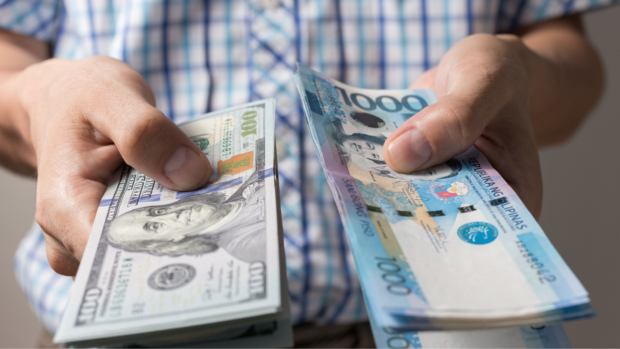Peso falls; breaches 54:$1
The Philippine currency fell by another peso against the US dollar in just six trading days, closing at 54.065 against the greenback on Monday as markets absorbed more deeply the “jumbo” rate hike that the US Federal Reserve made last week.
The peso remains at its weakest in three years and eight months, or since Oct. 15, 2018, when it closed at 54.08, just as it was on Friday when it closed at 53.75:$1. The local currency broke the 53:$1 mark only on June 10.
“The peso was weaker against the US dollar for the seventh day in eight trading days, after the recent weakness in other Asian currencies [following] the large 75-bp US Fed rate hike and continued hawkish US Fed signals,” said RCBC chief economist Michael Ricafort.
“Markets are still digesting the higher re-pricing of Fed rate expectations, and global risk assets may struggle to show any sustainable rebound for now,” added ING Bank in a commentary.
“All this should keep the dollar mostly in demand in a week where markets will focus on [Jerome] Powell’s testimony,” the bank said, referring to the chair of the US Fed board of governors.
Powell will testify in the US Congress next week and expected to expound on how the American central bank will dig in to tame inflation toward its goal of 2 percent, mainly with more interest rate hikes in upcoming policy meetings.
Here, rates of short-dated Treasury bills (T-bills) rose across the board on Monday as the market braced for a possibly upsized rate hike by the Bangko Sentral ng Pilipinas (BSP).
Rate hikes
Analysts said consumer price pressures arising from the war in Ukraine was revving up interest rate hikes at their fastest since the early 1990s, but the global food crisis may be nearing its peak.
As it capped interest rates, the Bureau of the Treasury (BTr) raised only P10.5 billion out of the P15 billion (P5 billion from each of the three tenors) it had planned to issue. Eligible dealers pitched to lend a total of P22.6 billion, or 1.5 times bigger than the amount the BTr wanted to borrow.
But as bid rates shot up, the BTr awarded only P3.07 billion in the benchmark 91-day T-bills. The average yield of three-month debt climbed to 1.759 percent from 1.572 percent last week.
The BTr raised P3.62 billion from 182-day IOUs at 2.132 percent, up from 1.934 percent previously.
The 364-day securities were awarded at an average annual rate of 2.454 percent, higher than last week’s 2.325 percent, such that borrowings were capped at P3.85 billion for the longest T-bill tenor.
“As expected, markets asked for a high premium to cushion against upward adjustments in rates delivered by the US Federal Reserve and to be followed on Thursday by the Monetary Board to quell rising price pressures,” National Treasurer Rosalia de Leon said.
“While incoming BSP governor Felipe Medalla spoke of gradual tightening, some analysts still see a 50-basis point (bp) move (on Thursday) following the 75-bps (hike) delivered by the (Federal Reserve) Fed to slash inflation,” De Leon added.
Fitch Ratings noted that last week’s 75-basis point increase in the United States Federal Funds rate was the biggest hike seen since 1994. It added that central banks in other major economies were moving policy tightening coming from extreme lows.
Maybank said that while supply constraints have caused a surge in local food inflation, there were signs that the global food crisis may be nearing its peak.
For one, fertilizer prices were nearing previous peaks in 2007-2008 food crisis, but started to fall in May.
Maybank added that: China’s ban on fertilizer exports would end in June; Indonesia had lifted the ban on palm oil exports; Malaysia’s chicken ban would likely be short-lived; and, rice prices were stable and ample supply would contain food prices.
